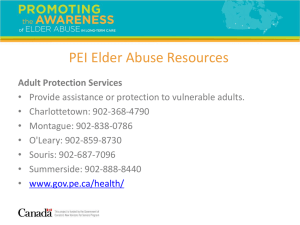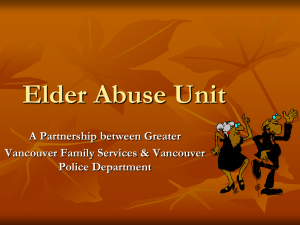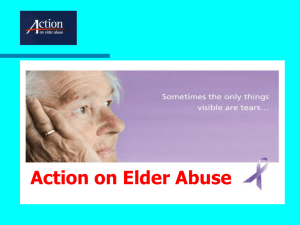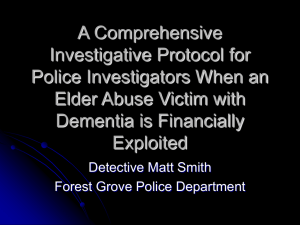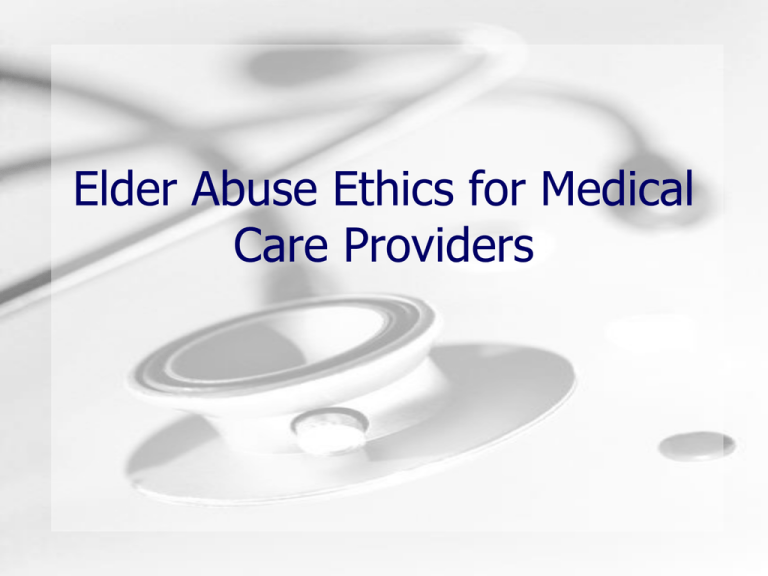
Elder Abuse Ethics for Medical
Care Providers
World Elder Abuse
Awareness Day 2012
June 11, 2012
The opinions expressed herein are not
necessarily the opinions of the District
Attorney’s Office. Each and every case is
evaluated in light of the facts particular to
that case.
Elder Abuse Ethics for
Medical Care Providers
• Presented by:
• Debbie Harrison and
• Harold S. Bartholomew, Jr.
Warning!
• The following presentation reflects the
views of the presenter, and not necessarily
the views of the District Attorney’s Office,
22nd Judicial District, St. Tammany and
Washington Parishes. Each case varies
based upon changes in factual situations.
Percent of Total Population Age 65 and Over:
1900 to 2000
14
12
1.2
1
10
0.5
8
0.04
6
2.9
3
3.3
3.8
1910
1920
1930
2
0.2
1.1
0.3
1.3
1900
4
0.2
1
0.2
1.2
0.3
1.7
4.8
2.2
2.6
0.7
3.4
4
1.5
4.4
3
85+
5.6
6.1
6.1
6.9
7.3
6.5
75-84
65-74
2000
1990
1980
1970
1960
1950
1940
0
Source: U.S. Census Bureau, decennial census 1900 to 2000
A growing % of population
Percent Aged 65 and Over of the Total
Population 2000 to 2050
30
20
12.4
13
2000
2010
16.3
19.6
20.4
20.6
2030
2040
2050
10
0
2020
Source: U.S. Census Bureau
Growing Numbers
Population aged 65 and over,
Millions
100
71.5
80
54.6
60
40
80
86.7
35
40.2
20
0
2000
2010
Source: U.S. Census Bureau.
2020
2030
2040
2050
Elder Protection Laws in
Louisiana
• A special agency to investigate – Elderly
Protective Services
• Mandatory Reporting of abuse
• Special financial abuse laws for the
protection of the infirm
Elder Abuse is a Crime
• Louisiana law protects adults aged 60 or
older from acts or omissions which result
in physical or emotional abuse and
neglect, inflicted by caregivers and from
self-neglect by an individual. Louisiana
law also protects seniors from acts of
financial exploitation and extortion.
Financial extortion or
exploitation,
•
•
•
•
such as theft or misuse of
money,
property or
possessions of the elder.
Exploitation of the
infirmed is:
• (1) The intentional expenditure,
diminution, or use by any person,
including a caregiver, of the property or
assets of the infirmed, a disabled adult, or
an aged person, … without the express
voluntary consent of the resident or the
consent of a legally authorized
representative of an incompetent resident,
or by means of fraudulent conduct,
practices, or representations.
Exploitation of the
infirmed is:
• (2) The use of an infirmed person's, or
aged person's, or disabled adult's power of
attorney or guardianship for one's own
profit or advantage by means of fraudulent
conduct, practices, or representations. La.
R.S. 14:93.4
Ethical and Reporting
Requirements
Mandatory Reporting
• La. R.S. 15:1504 requires reporting of abuse by
ANY PERSON “having cause to believe that an
adult's physical or mental health or welfare has
been or may be further adversely affected by
abuse, neglect, or exploitation shall report in
accordance with R.S. 15:1505.”
• Failure to report is punishable by up to six months
imprisonment and/or a five-hundred dollar fine.
R.S. 14:403.2.
Who do I call?
• R.S. 15:1505. Contents of report and agency
to receive report
• Report shall be made to any adult protection
agency or to any local or state law
enforcement agency.
• Need not name the persons suspected
• Contain, name and address of the adult, the
name and address of the person responsible
for the care of the adult, if available, and any
other pertinent information.
To Contact EPS
•
•
•
•
•
New Orleans Region
Phone: (504) 832-1644
Toll Free (In-state only): 1-800-673-4673
Fax: (504) 835-0409
State office Hotline: 800-259-4990
• http://goea.louisiana.gov
• http://goea.louisiana.gov/index.cfm?md=pagebuilder&tmp=
home&pid=5&pnid=2&nid=16
DHH & APS
• The Office of Aging and Adult Services
(OAAS), Adult Protective Services (APS)
DHH as the agency responsible for
carrying out the mandate of 14:403.2 with
regard to adults with disabilities ages 1859
• (225) 342-9057 or (800) 898-4910
• Fax (225) 342-9069
• http://www.dhh.state.la.us/offices/Default.asp?ID=95&Print
=1
Long Term Care Ombudsman
Program
• Phone (225) 342-7100
Toll Free (866) 632-0922
• Long Term Care Ombudsmen investigate and
resolve complaints made by or on behalf of
residents of long-term care facilities. Longterm care facilities include nursing homes,
assisted living facilities, and personal care
homes that serve individuals age 60 and
over.
• http://goea.louisiana.gov/index.cfm?md=page
builder&tmp=home&pid=4&pnid=2&nid=15
Investigation
• R.S. 15:1507. Investigation of reports,
assessment, actions taken, and court orders
• Elderly Protective Services or Dept. Health &
Hospitals (fact dependent) shall investigate
• Face to face interview with adult
• Access to any records or documents, including
client-identifying information and medical,
psychological, criminal or financial records
necessary…
• Agency is exempt from payment of fees for
records
Mandatory Reporting Licensed
Health Care Providers
•
•
•
•
•
•
R.S. 40:2009.20. Duty to make complaints; penalty; immunity
B.(1) Any person who is engaged in the practice of medicine, social
services, facility administration, psychological or psychiatric services;
or any registered nurse, licensed practical nurse, nurse's aide,
personal care attendant, respite worker, physician's assistant,
physical therapist, or any other direct caregiver having knowledge that a
consumer's physical or mental health or welfare has been or may be further
adversely affected by abuse, neglect, or exploitation shall, within twenty-four
hours, submit a report to the department (Dept. of Health and Hospitals) or
inform the unit or local law enforcement agency of such abuse or neglect. ….
(2) Any person who knowingly or willfully violates the provisions of this Section
shall be fined not more than five hundred dollars or imprisoned for not more
than two months, or both.
C. Any person, other than the person alleged to be responsible for the abuse
or neglect, reporting pursuant to this Section in good faith shall have
immunity from any civil liability…
D. All hospitals shall permanently display in a prominent location in their
emergency rooms a copy of R.S. 40:2009.20.
*Older than R.S. 15:1504.
Individual Duty
• While hospitals, and health care related
companies may have reporting
mechanisms in place
• Mandatory reporting applies to
• INDIVIDUALS
• Reporting to the company does not
absolve the individual of responsibility
Does anything prevent
reporting?
• HIPAA?
• Ethics / Scope of Practice?
http://www.hhs.gov/ocr/privacy/hipaa/faq/disclosures_required_by_law/909.html 5/19/2010
HIPAA
• …Where disclosures are required by
law, the Privacy Rule’s minimum
necessary standard does not apply,
since the law requiring the disclosure
will establish the limits on what should
be disclosed.
• Moreover, with respect to required by
law disclosures, a covered entity cannot
use the Privacy Rule as a reason not to
comply with its other legal obligations….
http://www.hhs.gov/ocr/privacy/hipaa/faq/dis
closures_required_by_law/909.html
HIPAA
• Section 164.512(a)(2) provides that in making a
“required by law” disclosure about adult abuse, neglect
or domestic violence (section 164.512(c)), for judicial
or administrative proceedings (section 164.512(e)), or
for law enforcement purposes (section 164.512(f)),
covered entities must also comply with any additional
privacy requirements in these provisions that apply.
However, none of the additional procedural protections
in sections 164.512(c), (e) and (f) apply to the type of
“required by law” disclosures to P&As under the
provisions of the DD and PAIMI Acts discussed here.
http://www.hhs.gov/ocr/privacy/hipaa/faq/disclosures_required_by_law/909.html
•
http://www.nysna.org/practice/positions/position3_10.htm 5/19/2012
•
http://www.nysna.org/practice/positions/position3_10.htm on 5/19/2012
• Duties of confidentiality, however, are not
absolute and may need to be modified . . .
in circumstances of mandatory disclosure .
..
32
Physicians
• The AMA recommends that physicians
routinely inquire about possible mistreatment
of elderly patients, much as they screen for
other conditions such as colorectal or breast
cancer.
• Precisely how to ask has not been
determined; however, if the questions raise
suspicion of an abusive situation, specific
steps need to be taken, as outlined below. …
•
Elder abuse and neglect: What physicians can and should
do, MAHNAZ AHMAD, MD, MS and MARK S. LACHS, MD,
MPH* CLEVELAND CLINIC JOURNAL OF MEDICINE VOLUME 69 •
NUMBER 10 pg 806 OCTOBER 2002
Dorne E. Rosenblatt, MD, PhD
Ann Arbor, Mich
Downloaded from www.archfammed.com on May 30, 2010
•
•
•
Care of the Aging Patient: From Evidence to Action | August 3, 2011
Elder Abuse and Self-neglect: “I Don't Care Anything About Going to the
Doctor, to Be Honest. . . . ” Laura Mosqueda, MD, XinQi Dong, MD, MPH
JAMA. 2011;306(5):532-540. doi:10.1001/jama.2011.10
Hospitals
• JCAHO requires hospitals to have criteria for
identifying victims of abuse and neglect.
• Hospitals must be able to identify victims of:
• • Physical assault
• • Rape
• • Sexual molestation
• • Domestic abuse
• • Elder neglect or abuse
• • Child neglect or abuse
•
HealthStream Regulatory Script, Identifying and Assessing Victims of Abuse
and Neglect (CE), Version: [May 2006]
36
• Mandatory Reporting vs. Patient Confidentiality
• Reporting requirements can present an ethical conflict
for healthcare providers.
• The patient may not want the provider to make a
report. The patient may expect the provider to protect
his or her confidentiality.
• The provider, on the other hand, must report.
• In this case:
• • Explain that the law requires you to report.
• • Work to keep a positive relationship with the patient.
Bear in mind that the goal is to improve the patients
situation, not to punish the patient or his or her family.
•
HealthStream Regulatory Script, [Identifying and Assessing Victims of Elder
Abuse and Neglect], Version: [May 2005]
37
38
39
40
Administrators and
Physicians
• Potential Civil Liability
• Potential Criminal Liability
• Negligence
A duty to inform: delay reporting allegations of child or elder abuse even—
for internal investigations—and you could land in jail - Safety & Security
Agenda, HR Magazine, September 2003, Diane Cadrain
The importance of reporting mistreatment of the elderly
American Family Physician, March 1, 2007 by Lisa M. Gibbs, Laura
Mosqueda
Immunity
• Any person “who in good faith makes a
report, cooperates in an investigation by
an adult protective agency, or participates
in judicial proceedings authorized under
the provisions of this Chapter,”
• “shall have immunity from civil or criminal
liability that otherwise might be incurred or
imposed. …” R.S. 15:1504
Identification and
Recognition
of Elder Abuse
The Right Questions
• Some of the right questions to ask elderly patients are
outlined in "Diagnostic and Treatment Guidelines on Elder
Abuse and Neglect," issued by the AMA in 1993:
• Has anyone at home ever hurt you?
• Has anyone ever touched you without your consent?
• Has anyone ever made you do things you didn't want to do?
• Has any one taken anything that was yours without asking?
• Has anyone ever scolded or threatened you?
• Have you ever signed any document that you didn't
understand?
• Are you afraid of anyone at home?
• Are you alone a lot?
• Has anyone ever failed to help you take care of yourself
when you needed help?
AMA Guidelines
• The guidelines state that the interview and
physical exam should be done apart from
the patient's caregiver and that doctors
who suspect abuse should report it to the
authorities. If the patient appears in
immediate danger, the doctor should
consider putting the patient in the hospital
or getting a court order for protection.
http://www.acep.org/content.aspx?id=30148
Physical indicators
• Incontinence with poor
personal hygiene,
excessive dirt, foul
odors, lice or fleas
• Alcohol and/or
substance abuse
• Inadequate or
inappropriate clothing
• Absence of eyeglasses,
hearing aids, prostheses
• Repetitive hospital
admissions or
emergency department
visits
• Unexplained injuries or
explanation inconsistent
with medical findings
• Torn, stained or bloody
underclothing
• Difficulty in walking or
sitting
• Pain, itching, bruising or
bleeding in anal or
genital area
• Unexplained venereal
disease or genital
infections
• An elder's report of
being hit, slapped,
kicked, or mistreated
• An elder's report of
being sexually assaulted
or raped
• Untreated bed sores or
decubiti
Behavioral indicators:
• Being emotionally
upset or agitated
• Being extremely
withdrawn and
noncommunicative or
non-responsive
• An elder's sudden
change in
behavior
• Fear or hesitancy
to talk
• Depression and/or
anger
• Disorientation or
confusion
• Change in appetite
or weight
• Isolation and/or
resignation
• Implausible stories
• An elder's report
of being verbally
or emotionally
mistreated.
Other indicators:
•
•
•
•
•
•
•
•
Unexplained inability to pay bills,
purchase food or personal items
Disparity between income and assets
and lifestyle
Lack of receptivity by family
members or elder person to any
necessary assistance requiring
money
History of alcoholism, drug abuse,
mental illness or past abuse in either
patient or primary caregiver
The elder may not be allowed to
speak for himself or be interviewed
without the presence of the
caretaker
Family member or caregiver "blames"
the elder, e.g., accusation that
incontinence is a deliberate act
Previous history of abuse by a family
member or caretaker to others
Obvious absence of assistance,
indifference or anger by the
caretaker toward the elder person
•
•
•
•
•
•
Aggressive behavior (threats,
insults, harassment) toward the
elder
Unwillingness or reluctance of
family members or caretaker to
comply with service providers in
planning for care and
implementation
Conflicting accounts of incidents
by the family, caretaker, and
victim
The caregiver's refusal to allow
visitors to see an elder alone
Unexplained delays in seeking
treatment or a series of missed
medical appointments.
Desertion of an elder at a
hospital, nursing facility, or
public location such as a
shopping center.
Written Protocols?
• Emergency room doctors are also in a
unique position especially to spot spouse
abuse. The U.S. Dept. of Health and
Human Services has vowed as one of its
health goals for 2,000 to insure that at
least 90% of the nation's hospital
emergency rooms use written protocols for
identifying, treating and referring victims
of domestic abuse.
• COPYRIGHT 1996 U.S. Government Printing Office
• COPYRIGHT 2008 Gale, Cengage Learning
• http://findarticles.com/p/articles/mi_m1000/is_n367/ai_182
00024/
No one is beyond abuse
•
•
•
•
65.7% female
42.8% were over 80 years of age
89.3% in domestic settings
6.2% of substantiated reports were in longterm care settings,
Who Are The
Perpetrators?
•
•
•
•
•
53% of alleged perpetrators were female
75% of alleged perpetrators under 60
Most common relationships
adult child 33%
other family member 22%
Most Common Forms of
Abuse
•
•
•
•
Of substantiated reports
Self-neglect was the most common 37%
Caregiver neglect 20%
Financial exploitation 15%
Who’s In Charge?
•
•
•
•
•
The Elderly Person
Is Always In Charge
NOT a relative
NOT a person with Power of Attorney
Only where Committed or Interdicted
does this change
• The Elderly Person decides who visits
them in Hospitals, and otherwise
• A Power of Attorney may not isolate
Fiduciary
What is a fiduciary?
Main Entry: 2fiduciary
Function: adjective
Etymology: Latin fiduciarius, from fiducia
confidence, trust, from fidere
Date: circa 1641
: of, relating to, or involving a confidence or trust:
as a : held or founded in trust or confidence b :
holding in trust c : depending on public confidence
for value or currency <fiduciary fiat money>
www.merriam-webster.com/dictionary/fiduciary
Fiduciary
CODE TITLE XIV--OF ALEATORY CONTRACTS
CODE TITLE XV--OF MANDATE
CHAPTER 1. UNIFORM FIDUCIARIES LAW
§3801. Definitions
For the purposes of this Chapter, unless the context or
subject matter otherwise requires:
(2) "Fiduciary" includes a trustee under any trust,
expressed, implied, resulting or constructive, executor,
administrator, guardian, conservator, curator, receiver,
trustee in bankruptcy, assignee for the benefit of creditors,
partner, agent, officer of a corporation, public or private,
public officer, or any other persons acting in a fiduciary
capacity for any person, trust or estate.
(4) "Principal" includes any person to whom a fiduciary as
such owes an obligation.
What is a Mandate?
• Art. 2989. Mandate defined
• A mandate is a contract by which a
person, the principal, confers authority on
another person, the mandatary, to
transact one or more affairs for the
principal.
Becoming a Mandatary
• Art. 2992. Onerous or gratuitous contract
• The contract of mandate may be either
onerous or gratuitous. It is gratuitous in
the absence of contrary agreement.
Becoming a Mandatary
• Art. 2993. Form
• The contract of mandate is not required to
be in any particular form.
• Nevertheless, when the law prescribes a
certain form for an act, a mandate
authorizing the act must be in that form.
Mandatary
• C.C. Art. 3001. Mandatary's duty of
performance; standard of care
• The mandatary is bound to fulfill with
prudence and diligence the mandate he
has accepted. He is responsible to the
principal for the loss that the principal
sustains as a result of the mandatary's
failure to perform.
Accounting
• Art. 3003. Obligation to provide
information
• At the request of the principal, or when
the circumstances so require, the
mandatary is bound to provide information
and render an account of his performance
of the mandate. The mandatary is bound
to notify the principal, without delay, of
the fulfillment of the mandate.
Some Types
of Elder Abuse
• According to the Mayo Clinic elder abuse
can take many forms, these include:
• Physical abuse.
• Sexual abuse.
• Emotional or Psychological Abuse.
• Neglect
• Abandonment
• Financial or Material Exploitation
• Self-neglect
Physical Abuse
•
•
•
•
•
Looks like child abuse
Slapped
Punched
Tied up
Cigarette burns
Physical Signs of Abuse
• The following slides in blue are from a
powerpoint provided by the New York City
Elder Abuse Training Project. Powerpoints
and more are available at their web site.
Bruises Healing Stages
10 hrs
4-5 days
12 days
Sites of Bruising
• In abuse victims, most often seen on
– Knuckles and fingers
– Face and neck
– Chest wall
– Abdomen
– Buttocks
– Palms and soles of feet
Bruising Distribution and Patterns
Medial Surfaces
Face & Neck
Bruising Patterns
• Bilateral
• Different colors
ranging from purple
(recent) to yellow
green (older)
• Shape and Pattern
• Facial distribution
Morphological Signs
• Bruises or burns shaped like an object
–
–
–
–
–
–
Iron
Curling iron
Belt marks
Fingers
Cigarette burns
Rope burns (e.g., resulting from restraints)
Other markers
• Burns:
– In healthy adults: rare
– In the frail elderly: rare in institutional settings
– 70% of all burns are the result of abuse/neglect
• Symptoms Similar to shaken baby syndrome
• Ruptured eardrums
– Boxing the victim’s ears
• Changes in hairstyle
– Cover up for
• Hair that may have been ripped out
• Bruises
Decubitus Ulcers
Bed sore
• Immobility
• Skin over bony surfaces
• Vasculature compression
• Vascular insufficiency
• Tissue necrosis
• Inflammation
• Infection
• Sepsis
• Shock
Skin Ulcers in Diabetic with Severe Vascular Insufficiency
General Condition
•Edges
•Centers
•Smell
•Surrounding Skin
Sexual Abuse
• RS 14:93.5 Sexual Battery of the Infirm
• (1) The offender compels the victim, who is physically
incapable of preventing the act because of advanced age
or physical infirmity, to submit by placing the victim in
fear of receiving bodily harm. …
• (4) The victim is incapable, through unsoundness of
mind, whether temporary or permanent, of
understanding the nature of the act, and the offender
knew or should have known of the victim's incapacity.
• B. … "sexual acts" mean the following:
• (1) touching of the anus or genitals of the victim by the
offender using any instrumentality or any part of the
body of the offender; or
• (2) The touching of the anus or genitals of the offender
by the victim using any instrumentality or any part of the
body of the victim.
• D. …not more than ten years.
Emotional or Psychological
Abuse
• infliction of anguish, pain, or distress
through verbal or nonverbal acts.
• verbal assaults, insults, threats,
intimidation, humiliation, and harassment.
• treating an older person like an infant;
• isolating an elderly person from his/her
family, friends, or regular activities;
• giving an older person the "silent
treatment;" and
• enforced social isolation
Neglect
• La. R.S. 15:1503
• “(10) "Neglect" means the failure, by a
caregiver responsible for an adult's care or
by other parties, to provide the proper or
necessary support or medical, surgical, or
any other care necessary for his wellbeing. No adult who is being provided
treatment in accordance with a recognized
religious method of healing in lieu of
medical treatment shall for that reason
alone be considered to be neglected or
abused."
Neglect at Home
• Ms. Scott was found on a sofa soaked in urine
and feces.
• Ambulance workers noted that Ms. Scott was very
sick and, after some resistance from her, she was
transported….
• After cleaning Ms. Scott from "head to toe,"
emergency room personnel determined that she
was in serious or critical condition with numerous
decubitus ulcers (bedsores) and a large, fresh
wound on her leg.
• Emergency room personnel contacted the Monroe
Police Department and made a complaint of
suspected elder abuse. State v. Smith, No.
38,154-KA (La. App. 4/14/2004) (La. App., 2004)
Abandonment
• La. R.S. 15:1503 defines abandonment as
• “(1) "Abandonment" means the desertion
or willful forsaking of an adult by anyone
having care or custody of that person
under circumstances in which a reasonable
person would continue to provide care and
custody. "
Financial Elder Abuse
is…………
•
•
•
•
A Crime
Going unpunished
Predictable
Causing this country significant economic
harm
• Apparently where child abuse & DV were
30 years ago
• Escalating
Elderly have the money
Exploitation
• La. R.S. 15:1503 defines exploitation as
• " (7) "Exploitation" means the illegal or
improper use or management of an aged
person's or disabled adult's funds, assets,
or property, or the use of an aged person's
or disabled adult's power of attorney or
guardianship for one's own profit or
advantage."
Caregiver Fraud
• “The victim was 78 years old, legally blind and
suffering from lung cancer at the time. During
the abovementioned seven-month period,
defendant wrote checks to herself from
Henderson's bank account. …induced
Henderson to sign some of the instruments
and forged Henderson's signatures on others.
• …defendant had used Henderson's credit card
to charge …in excess of $9,900. The
estimated losses the elderly victim realized as
a result of defendant's actions were over
$18,000.” State v. Ebarb, 772 So.2d 299 (La. App., 2000)
Self Neglect
• La. R.S. 15:1503 defines self neglect as
• " (12) "Self-neglect" means the failure,
either by the adult's action or inaction, to
provide the proper or necessary support or
medical, surgical, or any other care
necessary for his own well-being. No adult
who is being provided treatment in
accordance with a recognized religious
method of healing in lieu of medical
treatment shall for that reason alone be
considered to be self-neglected.“
Role of Elderly Protective
Services and Law
Enforcement
Investigation
• R.S. 15:1507. Investigation of reports,
assessment, actions taken, and court orders
• Elderly Protective Services or Dept. Health &
Hospitals (fact dependent) shall investigate
• Face to face interview with adult
• Access to any records or documents, including
client-identifying information and medical,
psychological, criminal or financial records
necessary…
• Agency is exempt from payment of fees for
records
• The following slides on what EPS does and
does not do are taken from the
presentation of Ms. Lutricia McDonald
done at the St. Tammany SALT sponsored
World Elder Abuse Day Seminar in June
2009. Please see her entire presentation
available on the St. Tammany SALT web
site.
What EPS Does:
• Locate and refer individuals to community
agencies and facilities that offer the
services they need. When necessary,
advocate ( that is recommend, support
and /or defend their rights.)
What EPS Does:
• Provide short-term, limited , case
management services. That is monitor the
case for stability
• Work with law enforcement to provide
protection
What EPS Does:
• Work with the judiciary system to remedy
problems that require legal action from the
D.A. or Judge when legal intervention is
warranted. Methods of Legal intervention
are
What EPS Does:
• Order to Enter Home
• Interdiction - full/limited
• Order for Injunctive Relief– Restraining Order
What EPS Does:
• Order for Mandatory Counseling
• Order for
Medical/Psychiatric/Psychological
Evaluation
• Power of Attorney
• Admission by Emergency Certificate
• Order for Protective Custody
What EPS Does:
• Judicial Commitment
• Protective Service Order- temporary
custody by EPS to place elder in a
protected environment until a more
permanent solution can be
arranged.
• Provide information and referral service to
individuals who do not meet the criteria for
elderly protective services.
What EPS does not do:
• EPS does not remove elders from their
homes against their will unless it is
determined that they are a danger to
themselves or others. If this is determined,
our office request an Order for Protective
Custody from the Coroner or a District
Judge and if granted, the elder is
transported by a law enforcement officer
to a facility for evaluation and/or
treatment.
What EPS does not do:
• EPS does not force nursing home
placement unless a doctor/psychiatrist
determines that the elder is no longer
mentally capable of making decisions,
there is no family member/s available or
willing or capable of caring for the elder
and a court of law deems the elder
incapable of caring for themselves or
having the mental capacity to know.
What EPS does not do:
• EPS does not provide discharge planning
for medical or other facilities.
What EPS does not do:
• EPS does not provide crisis intervention on
an emergency basis.
• Not on 24 hour call.
Law Enforcement
• Law Enforcement may receive calls from
EPS, DHH, other government agencies,
nursing homes, social workers, physicians,
or private individuals.
• There are many special laws protecting the
elderly.
Multiple criminal statutes apply specifically
to elderly victims
• 14:35.2 Simple battery of the infirm.
Minimum 30 days
• 14:42 Aggravated Rape.
Multiple criminal statutes apply specifically
to elderly victims
• 14:50.2 Perpetration or attempted
perpetration of certain crimes of violence
against a victim sixty-five years of age or
older. Adds 3 years to maximum, at
court’s discretion. .
• 14:67.16 C. (1) (b) Identity theft. If victim
60 years of age or older, minimum goes
from 0 years to 2 years.
Multiple criminal statutes apply specifically
to elderly victims
• 14:67.21 Theft of assets of aged person,
• 14:93.3 Cruelty to the infirmed,
Multiple criminal statutes apply specifically
to elderly victims
• 14:93.4 Exploitation of the infirmed,
• 14:93.5 Sexual battery of the infirm,
•
A Note on Visitors
•
•
•
•
•
•
The Elderly Person
Is Always In Charge
Of Visitors
NOT a relative
NOT a person with Power of Attorney
Only where Committed or Interdicted does
this change
Can I Look Up The Law?
• Yes!
• The Louisiana Legislature web site has a
searchable database of current law at:
http://www.legis.state.la.us/
Q&A
• Practical Problems
• Your Turn!


